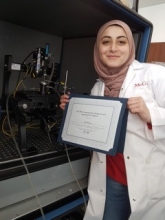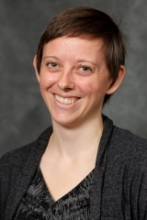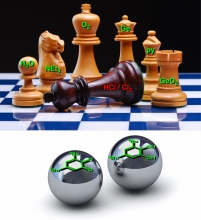It is with great sadness that we announce the passing of our friend and colleague Allan S. Hay, who passed away peacefully on August 14, 2017. Prof. Hay had an international reputation as one of the most creative and productive polymer synthesis chemists of all time. He made landmark discoveries in reactions leading to polymers/plastics that have had enormous impact on commercial products for the last 50 years.


We’re pleased to let you know that McGill student Siba Moussa (supervisor Janine Mauzeroll, Dept. of Chemistry), has received the Micro-Nanosystems Design Award for her technology, “A Micro-liter Temperature-Controlled Flow Cell for Small Scale Studies of CYP 3A4 Enzyme Behavior.”
Ms Moussa’s technology enables electro-chemical monitoring of enzymes, leading to a better understanding of their role in disease development. Judges praised her full working prototype for its multidisciplinary breadth, and its use of cost-effective materials.

Prime Minister Justin Trudeau has selected McGill Alumni, Dr. Mona Nemer (PhD 1982 in Organic Chemistry under the supervisor of Prof. Kelvin K. Ogilvie) to be the country's top scientist. Read more
Photo: Adam Scotti

The Principal’s Prize for Excellence in Teaching was established in 2000 to recognize excellence in teaching and its importance to the academic experience of students at McGill University. Traditionally awarded at Fall Convocation, awardees are named at the ranks of Faculty Lecturer, Assistant Professor, Associate Professor, and Full Professor. Laura is the 2017 recipient at the rank of Faculty Lecturer. Past winners can be viewed here (link 1), including Chemistry Department faculty Ariel Fenster (2013), Paul Wiseman (2007), Hanadi Sleiman (2002), and David Harpp (2001).

Dr. Xi-Jie Dai and Dr. Haining Wang share the prestigious Étudiants-chercheurs étoiles award (September, 2017) from the Fonds de recherche du Québec – Nature et technologies (FRQNT). This award recognizes the exceptional research contributions of university students (master's, doctorate), postdoctoral fellows and members of professional orders who are enrolled in advanced research training programs in any of the areas covered by the three Fonds de recherche du Québec. Xi-Jie Dai performed his Ph.D.

Researchers at McGill University have discovered a new way to use nanomaterials of a particular size and shape to perform old chemistry in a new fashion. Their finding, published in ACS Catalysis, highlights the use of cubic silver nanoparticles to harvest light for the activation of hydrogen in their hydrogenation reactions. These silver nanocubes possess an optical property called the surface plasmon resonance and their paper explores the use of these special properties in catalysis.

Bio-Physical Science seeks to understand the functioning of living systems from the level of individual molecules up to ecosystems by applying tools and theories drawn from physical sciences. The departments of Chemistry, Biology, Physics, Mathematics, Physiology, and Computer Science have brought together a set of undergraduate programs encompassing the many aspects of this expanding, interdisciplinary field.

We are very proud to announce the names of a the 2017 Graduate student awards! The award ceremony took place on a patio of the department on a sunny June 27 2017. On the photo, see from left to right: Rob Harkness, Yasser Gidi, Mihai Burai Patrascu, Igor Huskic, Collin Sonnichsen, Richard Lincoln, Leonora Abdullahu, Dustin Duncan, Zheng Huang, Sebastian Skanvik. The full list of awards is below:
RESEARCH AWARD
Udho Parsini Diwan Prize
Igor Huskic (Friscic)
"Minerals with metalorganic framework structures" Sci. Adv. 2016, 2:e1600621

Prof. J.P. Lumb received his tenure and is promoted to the rank of associate professor. Congratulations!


1,2-Oxy-aminoarenes are omnipresent in biologically active molecules and advanced materials, but current syntheses are often atom and step inefficient, and can require highly optimized and expensive catalysts. Recent work, conducted by graduate student Kenn Esguerra and postdoc Wenbo Xu in the Lumb Group, has made important strides towards improving the efficiency of 1,2-oxy-amioarene synthesis by interfacing two unrelated, but complementary, biosynthetic processes.

At the University of New Brunswick this morning, The Honourable Kirsty Duncan, Minister of Science, announced $51,968,051 for 223 projects at 39 universities across the country, including over $4.5 million across 14 projects at McGill, through the Canada Foundation for Innovation’s (CFI) John R. Evans Leaders Fund. The Fund was established to help universities like McGill innovate, as well as to attract and retain top research talent, by giving them access to cutting-edge research equipment, laboratories and tools.

Xijie Dai, Haining Wang and C.J. Li have recently demonstrated that carbonyl derivatives could be used in a similar fashion to Grignard reagents using a smart Umpolung strategy and thus replaced organometallic-based reagents for nucleophilic carbonyl addition reactions for alcohol synthesis.

For the second year in a row, students from the Green Chemistry course (CHEM 462) are releasing their journal issue, published online as The McGill Green Chemistry Journal. This volume gathers the reviews written by students who took the course. Students used peer evaluation, similar to the standard in scientific publication as a means to raise the quality of all the papers submitted.

The Sir William C. Macdonald Chair in Chemistry was established in 1901 and is one of the oldest Named Chairs at the University.
Dima has a significant international reputation that was recently validated in the Full Professor promotion process, and are one of the world’s most creative “designers” and makers of novel materials.
